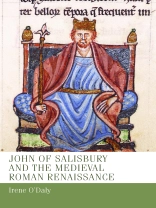This book is a detailed but accessible treatment of the political thought of John of Salisbury, a twelfth-century author and educationalist who rose from a modest background to become Bishop of Chartres. It shows how aspects of John’s thought – such as his views on political cooperation and virtuous rulership – were inspired by the writings of Roman philosophers, notably Cicero and Seneca. Investigating how John accessed and adapted the classics, the book argues that he developed a hybrid political philosophy by taking elements from Roman Stoic sources and combining them with insights from patristic writings. By situating his ideas in their political and intellectual context, it offers a reassessment of John’s political thought, as well as a case study in classical reception of relevance to students and scholars of political philosophy and the history of ideas.
表中的内容
Introduction
1 The Roman inheritance
2 Nature and reason
3 Defining duties: The cooperative model of the polity
4 Political relationships in context: The body politic
5 Moderation and the virtuous life
6 The princely head
Conclusion
Index
关于作者
S.H. Rigby is Senior Lecturer in History at the University of Manchester.












